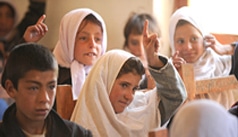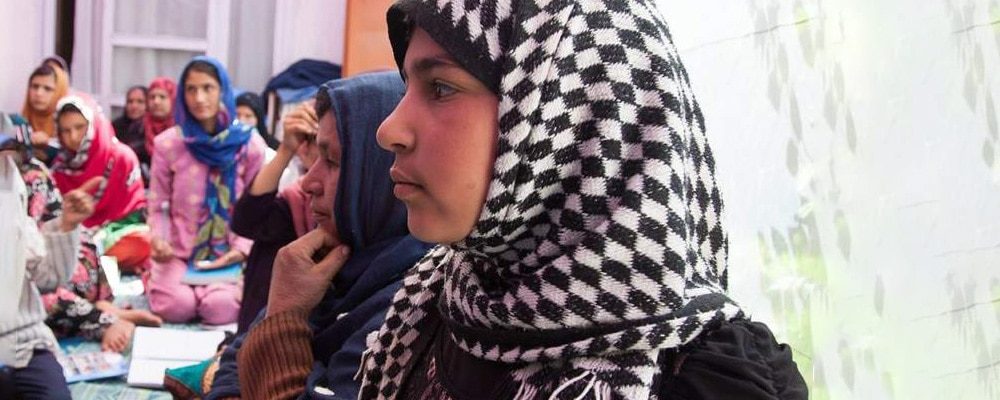In Wake of Taliban Peace Talks, Afghan Women Hope Basic Human Rights Still Theirs
Earlier this year the United States commenced peace negotiations with the Taliban in the hope of ending its 18-year military engagement in Afghanistan. While peace is on the table, other pressing issues are also at stake, namely the future of Afghanistan’s women.
Of utmost concern among the Afghan people is the possibility that the Taliban might regain influence in their country. Memories of life under Taliban rule are painful and, with no women invited to the negotiating table, women’s rights are especially vulnerable. The notion that Afghanistan could return to the repressive regime of the Taliban puts fear into the hearts of Afghans everywhere, especially women.
Women in Afghanistan: the backstory
Foreign invasions, wars, and the rise of extremist militant groups have colored the landscape of Afghanistan for the last forty years. Through it all, the rights of women were often exploited, abused, and — in the case of the Taliban — all but destroyed.
Prior to the 1979 Russian invasion, the story of women in Afghanistan reads very differently. The life of an Afghan woman largely mirrored the life of a woman living in the West. The government was progressive, the culture was rich in ideas, and women were free to go to school and work. In fact, from the 1930s to the late 1970s, fashionable Kabul was known as the “Paris of Central Asia.” Women dressed in stylish clothing and wore make-up. One in two government workers was a woman. Nearly three-quarters of Afghanistan’s teachers were women, and 40 percent of the physicians were female. Up until the early 1990s, women were making strides in education, work outside the home, and economic independence. Economic and livelihood programs that supported women to turn their handicrafts and other skills into money-making ventures were widely available, even in rural areas.
Russia’s 1979 invasion of Afghanistan started a downward spiral for Afghan women’s rights, culminating in the oppressive, extremist regime of the Taliban, which ran the country from 1996 to 2001.
Shortly after the Taliban came into power, the country’s infrastructure was destroyed. Most Afghans had no electricity and no phone service. Disconnected and geographically remote, Afghanistan was cut off from the rest of the world. Their economy was in shambles. The food supply was meager. Very few children, boys or girls, went to school. The girls who were able to go could not attend beyond fourth grade.
The years under the misogynistic Taliban regime were harsh for everyone, and nearly unbearable for women. Women could not leave their homes without a religiously-approved male companion, i.e. their father, husband, brother, or son. The wearing of burkas was mandatory. Women couldn’t work outside of the home. They couldn’t be treated by a male physician. Women were not allowed to bathe in the public baths despite the absence of running water in most homes.
Deprived of any semblance of independence or self-determination, the religious edicts stripped Afghan females of their inalienable rights as human beings. On the political front, the increasing infiltration of al-Qaeda led to greater and more frequent acts of terrorism, culminating in the catastrophic events of 9/11. With American troops in-country and the Taliban under siege, Afghans wanted peace above all else. They were eager to begin the hard work of reclaiming their country. For women, that work included regaining the rights they had been denied under the Taliban.
Afghans rebuild their country
In the years following the 2001 U.S. offensive against the Taliban and the election of a democratic, civilian government, Afghans worked against overwhelming odds to rebuild their political, cultural, and social institutions. Even though conditions continued to be difficult, brave women and men overcame extraordinary challenges to fight for women’s rights. Women and minorities are now protected under the Afghan constitution. Girls go to school. Women lecture and teach in universities, and women hold leadership positions in government including one-fourth of the seats in Afghanistan’s parliament.
Today I study or I go to university because I want to be a director, a deputy minister, minister, a parliament member, or president. Any issue that would threaten my wishes and my ambitions I would never want it, whatever it is, peace or war. Therefore, our hope for peace is that whatever comes with peace, we want that our freedom for children, youth, adults, women, and the elderly, and rights for education would be maintained. – Mr. Ahmad Shah Safi, Legal Advisor to the Afghanistan Ministry of Agriculture
The Afghan constitution, signed on January 26, 2004, reinstated all the rights that women had been denied under the Taliban regime. To lose those rights now or at any time in the future would be an assault on the rights of women not only in Afghanistan, but across the globe as well.
Afghanistan’s future is at stake
In early 2019, the United States entered into peace talks with the Taliban creating bewilderment and concern among the Afghan people. They feared that a Taliban return to power would undermine the progress that the country has worked so hard to build since the regime fell nearly two decades ago.
In a March 5, 2019, interview with NPR, Zarlasht Halaimzai, co-founder of Time4RealPeace, explained the situation this way: “The U.S. is negotiating with a group that’s notorious for denying women[’s] basic human rights. [Women] are concerned that constitutional rights to health care and education will be denied. At the moment, the Afghan Constitution protects women’s rights. [The prospect of losing rights] is something that’s really alarming—not just for Afghan women but for anyone who cares about women’s rights.”
Peace without rights is no peace at all

To present the Afghan woman’s perspective, we spoke to Nasrine Gross, a member of the Central Asia Institute’s Board of Directors. Born and raised in Afghanistan, educated at American University in Beirut, and employed for 20 years in information technology in the United States, Nasrine is uniquely qualified to comment on women’s issues in Afghanistan. Starting in 1996, Nasrine worked tirelessly to reinstate the inalienable rights of Afghan women made null and void by Taliban edicts. She collected 300,000 signatures worldwide in support of including women’s rights in the new Afghan constitution. Her tireless efforts to amplify the voices of hundreds of thousands of Afghan men and women who supported women’s rights and empowerment were successful; an equality clause protecting women and minorities was written into the Afghan constitution, signed in 2004.
At this juncture, it’s impossible to know what the results of the peace talks will mean for the future of Afghanistan. At a minimum, Nasrine wants to see the following outcomes for the women of Afghanistan:
- Women’s rights must not be negotiated.
- The Constitution of Afghanistan must be respected by all.
- The political institutions that have been built and rebuilt over the last two decades must remain intact.
- Women must be part of the peace negotiations.
While she remains optimistic, the worst-case scenario is a frightening one. “We do not want women’s rights to become a victim of peace!” says Nasrine.
You can help
The U.S. engagement in Afghanistan in 2001 extended beyond military operations to encompass a fight for women’s rights. Then First Lady Laura Bush spoke publicly in defense of women’s rights in Afghanistan and urged American women to lend their support. American women stepped up in droves, including a delegation that visited Afghanistan soon after the start of the military operation to better understand the horrendous treatment and abuse Afghan women had suffered under the Taliban.
Unfortunately, as the U.S. war in Afghanistan has worn on over the last 18 years with no solution in sight, the strong voices of American women who stood in solidarity with their Afghan sisters have largely gone quiet. Nasrine Gross asks, “Just because America is tired of the war in Afghanistan, are American women sick and tired of saying all women have the same inalienable rights?”
In February 2019, more than 700 women from 34 provinces across Afghanistan gathered at a conference in Kabul. Their purpose: to send an unequivocal message to the men now negotiating with the Taliban. “We want peace,” the women said, as reported in The New York Times (Feb 28, 2019), “but not at the cost of our rights.”
The fight for women’s rights in Afghanistan continues. We cannot send them into battle alone. Below are several ways to show your support:
- Speak up on their behalf.
- Urge members of Congress to protect women’s rights in Afghanistan.
- Submit an op-ed to your local newspaper.
- Voice your support on social media.
- Share and discuss articles like this one with friends and family members, in your book group, at your church, and in your community.
- Donate to an organization working on behalf of women’s rights and education in Afghanistan.
Protecting the rights of women in Afghanistan is a critical step on the path toward ensuring the inalienable rights of all human beings throughout the world, regardless of their gender, age, nationality, religion, ethnicity, or income. Thank you for your support and for reading and sharing this post.












4 responses to “In Wake of Taliban Peace Talks, Afghan Women Hope Basic Human Rights Still Theirs”
A vital article to understand the history of the nation of Afghanistan .
No country that refuses to enshrine and defend women’s ri’s rightsghts can claim to uphold human rights for all. It should be unnecessary to state that women’s rights are inextricable bound to, and are part of human rights. Otherwise a country constructs a one-legged stool that cannot stand. #WomenHoldUpHalfTheSky
Thank you for sharing this information CAI. I try to stay informed, watching the news and reading when I can on issues – but I had no idea about these peace talks with the Taliban. I have read you emails regularly through many years now, beginning when I was given Three Cups of Tea as a birthday gift. Again, thank you for what you do!
Thank you for your support, Pam! That brightens our day.